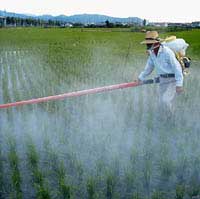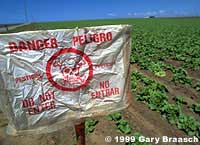The strangest news items about organic food have been popping up. It isn’t good for you after all. It’s full of bacteria and insect parts. You folks who pay a high price for it are not only suckers, you’re risking your health.

Toxic tomato? Not if it’s organic.
ABC’s John Stossel recently interviewed Dennis Avery, “a leading critic of organic produce,” who said organic foods are grown with (oh no, tell me it’s not true!) manure. As we all know, manure is “infested with bacteria.” Furthermore, organic farmers “waste land and resources because they lose so much of their crop to weeds and insects.”
Before I get into speculating about why anyone would want to be a “leading critic of organic produce,” let me quickly dispose of his claims.
All kinds of crops, organic or not, are raised with manure. Any farmer in his right mind who can get hold of manure to put on his land does so, because it’s a cheap, long-lasting fertilizer. Not only does it provide nutrients, it helps soil hold moisture, giving it a better texture for plant roots — something fertilizer from bags doesn’t do.
Vital nutrients have been cycling through soil, plants, animals, manure, and back to the soil for eons. Farmers have been riding that cycle since farming began. As a farmer, I have had regular contact with chicken, sheep, cow, and horse manure for decades, and I have lived to tell the tale. Anyone with the wit to wash hands and veggies need have no fear of manure. Pesticides are harder to wash off, especially when the plants are genetically engineered to produce them in every cell. Given a choice between meeting up with an honest cow patty or some malathion, there’s no doubt which I’d pick.
Organic farmers do not lose more to pests or weeds than other farmers. They do not get lower yields, though Dennis Avery (who was in the Agriculture Department under Reagan and now works at the right-wing Hudson Institute) constantly claims otherwise. Both chemical-using and organic farmers on average lose 30 percent of their output to pests or weeds.

Having a field day with pesticides.
The loss rates are similar because pesticide users typically grow monocultures, miles of the same crop year after year, a sure recipe for breeding that crop’s pests. Pesticides beat back the enhanced pest populations to roughly where they would be if crops were interplanted and rotated — which is to say, if they were grown the way organic farmers grow them. Pesticides don’t reduce crop loss, they just permit monocultures. Monocultures lend themselves to mechanization and industrialization. We like to think they reduce costs, but we do not count the costs of spraying poisons across the land or eating pesticide residues in our food.
It’s because our foods are increasingly mechanized, industrialized, engineered, poisoned, and irradiated that organic foods are becoming popular. At present there are 6,600 certified organic farms in the United States, large and small, north and south, growing everything from grain to grapes. There are also many uncertified organic farms; only 31 states have certification programs. Altogether consumers buy about $6 billion worth of organic food each year, about one percent of the U.S. food budget.
Doesn’t sound like enough of a threat to mount a publicity campaign against it. But the organic food market has been growing at 20 percent per year in America, faster than that in Europe and Japan. British supermarkets comb the world for organic produce. Sainsbury’s, a major U.K. grocery chain, has approached the governments of two Caribbean nations, Grenada and St. Lucia, to plant hundreds of acres of organic bananas, mangoes, coconut, and passion fruit, to be shipped exclusively to its stores.

They call this healthy?
I have walked in a Central American banana plantation, where there were no visible living things other than people and bananas. I was cautioned not to touch the plants, not to pick up fallen fruit, to wash myself and my clothes thoroughly upon leaving, because of powerful sprays that were used on a weekly basis. This is the produce that Dennis Avery wants us to regard as healthy.
I guess that the recent spurt of negative campaigning against the word “organic” stems not only from worry about the rapid growth of the U.S. organic market, and not only from fear that British enthusiasm for organic foods might spread our direction, but also because of the release of our first national organic standard. After 10 years of planning, this set of rules for organic certification was announced on March 7 and will go into effect later this year.
A national standard will provide a label that, if the USDA does its job, consumers can trust. No, I’m not sure the USDA will do its job. It took a huge protest from farmers and consumers to head off its plan to allow bioengineered crops and crops fertilized with sewage sludge to be labeled “organic.” I’m happy with strict, well-administered state standards like the ones we farm under in New Hampshire and Vermont. But if we want our organic farmers to have a national or export market, we need a national standard.
By the way, the new standard does not allow fresh manure to be applied to any food crop within 90 days before harvest.
So don’t listen to the public relations campaign against organic food. It’s all just a load of you-know-what.

